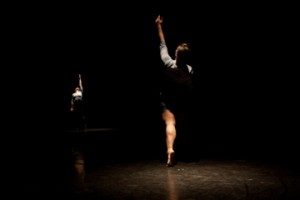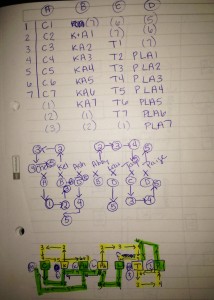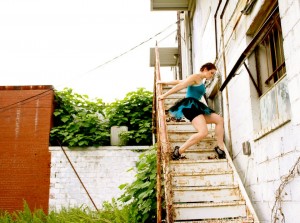8 Lessons for Dancers in Higher Education
8 Lessons for Dancers in Higher Education
by Sarah Wildes Arnett
1. Dance is not a terminal field, even though the MFA is. Most dancers (and performers in general) know and accept this as truth – dancers are students their entire lives. There is always a way to improve and become better as our bodies change and as the field evolves. I accepted this long before making the decision to go back to school. What I did not realize until much later was that this applies to my creative work as well. As I went into my thesis work and now, as a professional and in setting choreography on my students, I started the process of reworking old choreography. I’ve now taken what was originally a sextet and translated it into a duet (which works much better that way) that has been reworked at least five times on different dancers, each time finding out new information about the piece. The piece has evolved from a general exploration of rhythms and patterns to being about a simple relationship to death and the afterlife. I’m pretty sure it’s not perfect yet.
2. It’s ok to beat a dead horse (figuratively). Not every piece has to be a masterpiece and you don’t have to make work about something new and different every time. Some things are worth investigating again and again. Just because you tried something once doesn’t mean you are done and that you cannot do it again.
3. Age is just a number. I went to school with people from all walks of life, including those in my MFA program and the undergraduates working on their BFA and BA degrees. I truly believe that there are things to be learned from each other, no matter what the age as everyone brings in their own experiences and ideas. One of the best collaborators I ever worked with in graduate school (and best friends I’ve ever made) was an undergraduate student, Megen Burgess. We still work together and talk weekly about dancing ideas even though we live 9 hours away from each other.
4. Not every rehearsal has to be in a studio. Megen and I created an entire duet (and mind you, a very physically challenging duet) without managing to spend but maybe a total of 4 hours dancing. Sometimes you just need to have rehearsal at El Carreton. Sometimes you just have to draw a dance.
5. Write everything down. I cannot tell you the number of brilliant ideas (and I mean brilliant – I should be Trisha Brown by now) that I have forgotten because I didn’t write them down. I try to keep notebooks all over my house, car and office so when inspiration hits, I can jot it down. Really, my phone has been my best friend as I’ve been able to quickly video a movement idea, snap a picture, or even jot down a note if I need to. I don’t always follow through on these ideas, but anytime I get stuck and need inspiration I can go back and see what I have written down.
6. Know that its never too late to change your mind or start over. Just because an idea was your first idea, doesn’t mean it has to be the last. Sometimes you have to allow your work to go a different direction – it’s not always the one you intended, but that is ok! I changed the music to a piece once right before the performance. The dancers didn’t even hear it before the show, but it made the performance so much stronger as they were able to react and respond in a way a rehearsed piece of music wouldn’t have allowed. Sometimes you start making a dance about death and you end up making a comedy. It happens. Let it.
7. Allow yourself (and others) to make mistakes. Instead of getting aggravated, allow your dancers to be human. Some of the best moments in my work happened by happy mistake. Dancers mess up and sometimes that mess is beautiful. Sometimes it’s totally not, just hope you got it on camera and can laugh about it later.
8. Never speak negatively about anyone, at least in public. You NEVER know who is sitting behind you in the theatre or who might be hiring at the next audition. And on that note, remember that the people you ask to serve as references aren’t the only people who might give a reference for you! Many times a hiring agent will see your education and contact a friend that works at your alma mater and ask why they weren’t listed as a reference. Be professional, all the time, at least in public.
This is just a short list of some of the things I hope to pass on, but it is not in any way a comprehensive list. Just remember, you always have room to learn and to grow.
——————
Sarah Wildes Arnett is Founder/Artistic Director of SWADanceCollective and Assistant Professor of Dance at Valdosta State University in Georgia. She received a Master of Fine Arts in Dance Choreography at the University of North Carolina at Greensboro in 2012 and a Bachelor of Arts in American Studies from Vanderbilt University in Nashville, Tennessee. Sarah’s interests are interdisciplinary as she enjoys integrating her talents in film-making, photography and music composition into her choreography while also expanding boundaries of genre and style. She continues to perform professionally with various companies and artists in the southeast. Most recently, she has performed and shown work at the MAD Festival (Atlanta), Alabama Dance Festival (Birmingham), NC Dance Alliance Annual Event (Greensboro) and RE:Vision by Forward Motion Theatre (NYC). http://www.swadanceco.com/
MFA Mondays




Sarah, this is so wise. Thank you for your contributions! I identify with ALL of these, thank you for sharing and for creating words for these very important understandings.